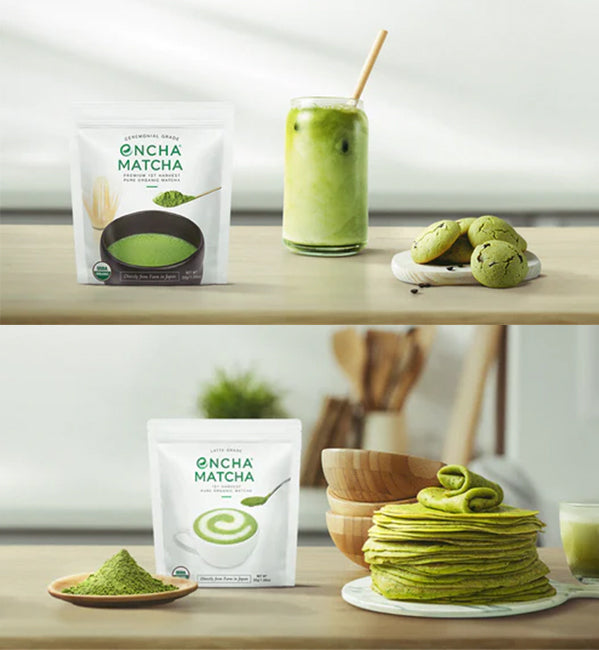Matcha Vs Coffee: Head to Head
Origins and Preparation:
- Coffee: Derived from the roasted beans of the Coffea plant, coffee is a global favorite known for its bold flavor and various brewing methods.
- Matcha: Hailing from the refined Japanese tea ceremony tradition, matcha is a powdered green tea made from ground tea leaves, ensuring you consume the entire leaf and all its goodness.
Caffeine Content:
- Coffee: Renowned for its potent caffeine kick, coffee is a quick energy fix that can be a boon for those seeking an immediate boost.
- Matcha: While matcha contains caffeine, it delivers a more gradual release due to the presence of amino acid L-theanine. This dynamic duo provides sustained alertness without the sudden spikes and crashes associated with coffee consumption.
Antioxidant Powerhouse:
- Coffee: Coffee does contain antioxidants, but matcha steals the show with higher levels of catechins. These potent antioxidants are renowned for their potential health benefits, including immune system support and cellular health.
Ground Tea Leaves vs Coffee Beans:
- Coffee: Coffee is brewed from ground coffee beans, offering a diverse range of flavor profiles based on the bean's origin and roast.
- Matcha: Made from finely ground green tea leaves, matcha delivers a unique, vibrant taste with earthy undertones. The consumption of the entire leaf ensures you receive the full spectrum of nutrients and antioxidants.
Traditional Japanese Green Tea Influence:
- Coffee: Coffee's roots can be traced back to various coffee-producing regions globally, each contributing to its unique cultural significance.
- Matcha: Grounded in Japanese culture, matcha has its origins in the revered Japanese tea ceremonies. It symbolizes tranquility, respect, and the meditative art of tea preparation.
Unleash the power of matcha tea with Encha
Matcha powder undoubtedly holds many benefits over coffee and can be the key to increased health and happiness. For the best results, though, you must choose an organic product.
Contact Encha to find out more about the best matcha green tea and latte powder on the market!
FAQ's
Is matcha better to drink than coffee?
One of the reasons why matcha is better than coffee is because matcha helps to stabilize blood sugar levels and reduces stress on the adrenal gland, and has the effect of reducing cortisol levels and increasing calmness due to l-theanine. Coffee actually has the opposite effect where it in fact promotes an adrenaline and cortisol spike. On top of this, matcha simply contains more antioxidants and health benefits than coffee.
Is it okay to drink matcha every day?
Drinking a cup of matcha every day can be safe for most people as part of a healthy and balanced diet. Matcha contains caffeine, which can be beneficial for improving alertness, mood, and cognitive function. Additionally, matcha is rich in antioxidants and other beneficial compounds, which may offer various health benefits. It is recommended to limit your daily matcha intake to around 1-2 cups per day, or around 200mg of caffeine.
Additionally, it's important to consider the quality of the matcha you are consuming. Some matcha products may contain added sugars or other additives that can be harmful to your health. To ensure you are getting the most health benefits from your matcha, choose high-quality, organic matcha powder and avoid sweetened or flavored varieties.
Does matcha have fewer side effects compared to coffee?
Yes, matcha generally has fewer side effects compared to coffee. While coffee can sometimes cause jitters, increased heart rate, and digestive issues in sensitive individuals, matcha is known for its gentle and steady release of caffeine. The presence of L-theanine in matcha also helps to counterbalance the potential negative effects of caffeine, promoting a sense of calmness and preventing the crash often associated with coffee consumption. Moreover, matcha is less likely to cause stomach irritation or acid reflux, making it a gentler option for those with sensitive digestive systems.





